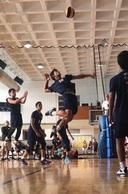Roy Rossello '20 Recruiting Profile

Video
 2020 Highlights
2020 Highlights 2020 Highlights #2
2020 Highlights #2Personal Statement
I was living in Puerto Rico when Hurricane Maria destroyed most of the island. Things that I
was never afraid of, like wind and rain, were terrifying. When the sun rose, everything was different, it
was like I was on an alien planet where nothing looked the same. By the time we got power back, it did
not matter; we were already gone. My mom, my younger brother and I gathered what belongings we
had and left for America to try and rebuild our lives after what we had lost.
My life in Puerto Rico was normal. My mom is a single mother who takes care of both my little brother
and me. I went to private school, played many sports, and had friends, just like any other high schooler. But
that was before the Hurricanes. Leaving Puerto Rico meant dropping my whole life and moving
somewhere I had never been and starting everything over again. When I moved to Miami, I had to go
public school, where I was overwhelmed by the huge number of students. I was no longer one of 600
kids; I was a small fish in an ocean of over two thousand others. Everything was different. I did not know
anyone, and I had to adapt to a completely new school and new courses on top of managing a new life
in the United States.
At first, I did not know how to react or how to start over again. I had no friends in Miami; all I had was
my family. I was homesick. I missed my friends, my home, and my old life. That all changed one day in
P.E. class. As I was getting ready to leave, the teacher mentioned that there were Volleyball tryouts
coming up and asked me if I was going. I said no. I remembered playing volleyball back in Puerto Rico
with my friends and how much fun I had. That only made me more homesick. But after talking about it,
the teacher convinced me to give it a shot, and I did. Ever since I went to those tryouts my life has
turned around completely. Volleyball has helped me cope with my homesickness and given me the
chance to make new friends. My position on the team is the libero. My position is kind of like my life: I took hard hits and I could not
really do anything about it. It was difficult until I realized how important a team really was. When I met
friends and started to get used to my new life, I started returning those hard hits and setting up to score.
At this point in my life, I’m not only scoring points, I’m winning the game and I don’t plan on stopping
after high school. The attitude towards success and overcoming obstacles that Volleyball has helped me
develop are going to push me from being just a kid who had to rebuild his life to an athlete and student
who will build a new life better than what I ever thought could be possible.
Athletics
High School Information
- Years w/ Varsity
- 1 year
- Varsity Starter
- 1 year
- 2020 Varsity Team
- Starter- Jersey: #
Club Information
- Seasons of Club Experience
- 2 seasons
- 2020 Miami United Volleyball Club (18th)
- 2019 Coastal Volleyball Club (FL) (17th )
Coach References
- Club Coach
- Christopher Kallinossis
- Club Coach
- Johnathan Bluhm
- High School Head Coach
- Alberto Pacheco
- High School Head Coach
- Juan Carlos Veléz
- Athletic Director
- Alex Rivera
Events
- Camp/Event
- Hialeah vs ronald Reagan
- 4/23/20 to 4/23/20
- home game 3:30
- Camp/Event
- goleman vs Ronald Reagan
- 4/20/20 to 4/20/20
- away game 3:30
- Camp/Event
- Hialeah education Academy vs Ronald Reagan
- 4/16/20 to 4/16/20
- home game 3:30
- Camp/Event
- Miami spring vs ronald Reagan
- 4/15/20 to 4/15/20
- Away game 3:30
- Camp/Event
- terra vs Ronald Reagan
- 4/14/20 to 4/14/20
- Away game 3:30
- Camp/Event
- american vs Ronald Reagan
- 4/09/20 to 4/09/20
- home game 3:30
- Camp/Event
- coral reef vs Ronald Reagan
- 4/07/20 to 4/07/20
- Away game 5:00
- Camp/Event
- edison vs ronald Reagan
- 4/06/20 to 4/06/20
- home game 3:30
- Camp/Event
- Sunset vs ronald reagan
- 4/02/20 to 4/02/20
- Away game 6:00
- Camp/Event
- miami high vs ronald Reagan
- 3/31/20 to 3/31/20
- home game 3:30
- Camp/Event
- krop vs ronald reagan
- 3/20/20 to 3/20/20
- away game 3:30
- Camp/Event
- varela vs ronald reagan
- 3/19/20 to 3/19/20
- 3:30 pm home game
- Camp/Event
- Westlast Hialeah vs ronald reagan
- 3/16/20 to 3/16/20
- Away game 3:30 pm
- Camp/Event
- Hialeah gardens vs ronald Reagan
- 3/12/20 to 3/12/20
- Away game 3:30 pm
- Camp/Event
- north miami vs ronald reagan
- 3/09/20 to 3/09/20
- Home game 3:30 pm
- Camp/Event
- killian vs ronald reagan
- 3/03/20 to 3/03/20
- away game 3:00 pm
- Camp/Event
- mater academy vs ronald reagan
- 3/02/20 to 3/02/20
- home game 3:30 pm
- Camp/Event
- coral park vs ronal reagan
- 2/27/20 to 2/27/20
- away game 3:30 pm
- Camp/Event
- Columbus vs Ronald Reagan
- 2/26/20 to 2/26/20
- Volleyball High School Varsity 3:30 pm
Additional Sports
- Basketball
- 10 years
- Varsity Team
- Coaches Award - Basketball - 2017 - Robinson School , Outstanding Performance - Basketball 2017 - Robinson School Outstanding Performance Varsity Award - 2017 - Robinson School, Athlete of the Year - 2016 - Robinson School, MVP - Basketball - 2016 - Robi
- Soccer
- 4 years
- Varsity Team
- MVP - Soccer - 2017 - Robinson School, Athlete of the Year - 2016 - Robinson School, Outstanding Award - Soccer 2015 - Robinson School, Athlete of the Year - 2014 - Robinson School , Coaches Award Outdoor - Soccer 2014 - Robinson School
- Volleyball
- 8 years
- Varsity Team
- Athlete of the Year - 2016 - Robinson School, Coaches Award Volleyball - 2016 - Robinson School , Athlete of the Year - 2014 - Robinson School , Coaches Award Volleyball - 2014 - Robinson School
- Track
- 2 years
- Junior Varsity Team
- MVP - Track & Field 2014 - Robinson School
- Cross Country
- 2 years
- Junior Varsity Team
Statistics
| Statistic | 2019 Coastal Volley |
|---|---|
| Attack Kills | 1 |
| Attack Errors | 5 |
| Total Attempts | 8 |
| Kill Percentage | 12.5 |
| Kills/Game | 0 |
| Solo Blocks | 0 |
| Assisted Blocks | 0 |
| Block Errors | 0 |
| Total Blocks | 0 |
| Blocking Percentage | 0 |
| Blocks/Game | 0 |
| Digs | 263 |
| Digs/Game | 3.5 |
| Receiving Chances | 297 |
| Receiving Errors | 21 |
| Aces | 32 |
| Aces/Game | 11.1 |
| Service Errors | 34 |
| Serving Percentage | 88.2 |
| Games Played | 24 |
| Matches Played | 24 |
Academics
Grades
Test Scores
High School Information
Academic Accomplishments
Are you in honor classes?
NoAre you in AP/IB classes?
NoRegistered with the NCAA Eligibility Center?
NoAwards and Activities
- ActivitiesS.W.A.T Club Allport Syndrome - Fundraising Volunteer
Top NCSA Athletes at Ronald W. Reagan/Doral Senior High School




Top NCSA Athletes in Area




